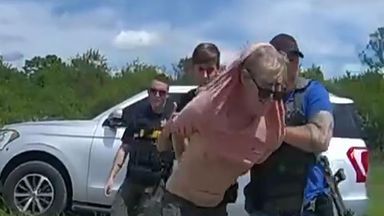Five unanswered questions about the apparent assassination attempt on Donald Trump
A 58-year-old man has been charged in connection with the incident over the weekend – but as the FBI continues to investigate, five important questions remain unanswered.

The suspect in an apparent assassination attempt against Donald Trump over the weekend has been charged with two federal gun crimes.
Plenty of information has come to light about suspect Ryan Wesley Routh, 58, who was arrested following the incident on Sunday at Mr Trump‘s golf club in West Palm Beach, Florida, where the former president was playing at the time.
But the FBI says an investigation is “still at the early stages”, and there are still a lot of unknowns following the incident.
Here are five key unanswered questions after the alleged shooting attempt.
Did Routh know Trump would be playing golf? If so, how?
Mr Trump’s visit to his golf course in West Palm Beach was not on his public schedule, acting United States Secret Service (USSS) director Ronald Rowe Jr has said.
Speaking to reporters on Monday, Mr Rowe Jr said it was an “off the record movement” and he “wasn’t supposed to have gone there”.
It might help explain why it took so long for Routh to be detected – a point that will be covered shortly.
But it also raises questions over whether Routh knew Mr Trump would be attending the course, or if he was simply waiting there without intel and hoping the former president, who plays golf regularly, would turn up.
How did Routh go undetected for 12 hours?
Routh spent about 12 hours around the golf course in West Palm Beach before he was spotted by the agent, according to an FBI analysis of mobile data.
Officials said in the documents that Routh’s mobile phone was shown near the tree line at the golf course from 1.59am until 1.31pm on Sunday, with Mr Trump arriving there in the afternoon.
Routh was “lying in wait” for him, the Palm Beach state’s attorney said.
Mr Trump was on the course’s fifth hole when a USSS agent who was sweeping the golf course saw a rifle barrel poking through a fence slightly further along the course’s boundary.
The suspect was on the “public side” of the fence, Mr Rowe Jr said.
The agent “immediately discharged his firearm,” he added, firing several shots, which led agents with Mr Trump to tackle him to the ground to protect him.
The alleged gunman, who the FBI said didn’t have a line of sight to Mr Trump, fled the scene after the agent fired at him, and did not fire any shots himself.
He sped away in a car and was arrested in a neighbouring county within an hour.
Mr Trump himself has praised the USSS for their response to the shooter, but questions have been raised over why it took so long for Routh to be spotted, especially because the incident came just nine weeks after another gunman grazed his ear with a bullet during a rally in Pennsylvania.
Mr Rowe Jr said the USSS didn’t do a full security sweep of the course because it was an impromptu visit.
“It wasn’t part of his schedule,” he said. “So there was no posting up of it, because he wasn’t supposed to have gone there.”
But he added the USSS “put together a security plan, and that security plan worked”.
What were Routh’s motives?
A lot of information has surfaced about the 58-year-old Hawaii resident since the incident unfolded – but with a history of showing support for both political sides and an obsessive interest in the Ukraine war and China-Taiwan tensions, his character profile is proving to be complex.
Records show Routh registered as an unaffiliated voter in North Carolina in 2012, most recently voting in person during the state’s Democratic Party primary in March 2024.
Campaign finance records show Routh has made 19 small political donations totalling around $140 (£106) since 2019 to ActBlue, a political action committee that supports Democratic candidates.
Although he appears to have supported the Democrats in recent years, it seems Routh voted for Mr Trump in the 2016 presidential election before changing his mind about him during his time in office.
Routh wrote in a social media post in June 2020: “While you were my choice in 2106 [sic], I and the world hoped that president Trump would be different and better than the candidate, but we all were greatly disappointment and it seems you are getting worse and devolving.
“I will be glad when you [are] gone.”
Read more:
Trump describes being dashed off in golf cart
White House criticises ‘irresponsible’ Elon Musk
Biden says Secret Service ‘needs more help’
There is also the question of whether Routh was acting alone.
“If he’s the lone gunman, President Trump is that much safer because we have him,” said the Palm Beach sheriff. “But if he’s part of a conspiracy, then this whole thing really takes on a very ominous tone.”
So far, authorities do not believe Routh was acting with anyone else but say he had an active online presence and are compiling details of the subject’s movements in the weeks before his arrest.
Speaking to CNN on Sunday, Routh’s son Oran told CNN that he hopes “everything has been blown out of proportion” and that it would be unlike his father to “do anything crazy, much less violent”.
Where did Routh get the gun?
After apprehending Routh, authorities revealed they had discovered an AK-47 type assault rifle complete with a scope at the scene he is believed to have fled from.
The exact model of the weapon is unclear at this stage, but semi-automatic versions of the rifle are legal with a licence in Florida, while fully automatic models are allowed under very specific restrictions.
However, the FBI said Routh was prohibited from possessing a weapon because of prior convictions, leading him to be charged with possession of a firearm as a convicted felon and possession of a firearm with an obliterated serial number.
The FBI has confirmed reports that Routh had numerous charges for handling stolen goods between 1997 and 2010, and was investigated in 2019 when someone reported he had a firearm.
How could this incident impact the election?
Just seven weeks out from election day, the question of how another security incident might impact Mr Trump in the polls is an urgent one, according to analysis from Sky News’ US correspondent Martha Kelner.
“His campaign team are alive to the political opportunity this event presents, particularly with the polls so tight between him and Kamala Harris,” she says.
After surviving the assassination attempt in July, the photos of Mr Trump with a bloodied ear and raised fist framed him as a “living martyr”, Kelner adds, helping him soar ahead of President Biden in all seven key swing states.
“But it is a very different race now,” she says.
“Kamala Harris is his opponent and has closed the gap on him in the polls, even nudging ahead in some of those crucial states.”
She adds the attempt on his life in July no longer feels like a significant factor in the race, and points out that history suggests assassination attempts don’t equal a lasting boost to campaigns.
“Another former president, Gerald Ford, was targeted by two would-be assassins in the space of just over two weeks in 1975,” she says.
“He became slightly more popular after, like Trump, declaring he would not shy away from public appearances. But his approval rating fell below the pre-assassination attempt level and he lost his reelection campaign the following year.”



